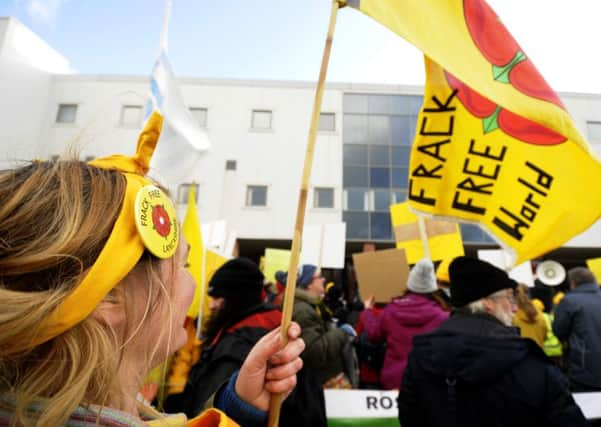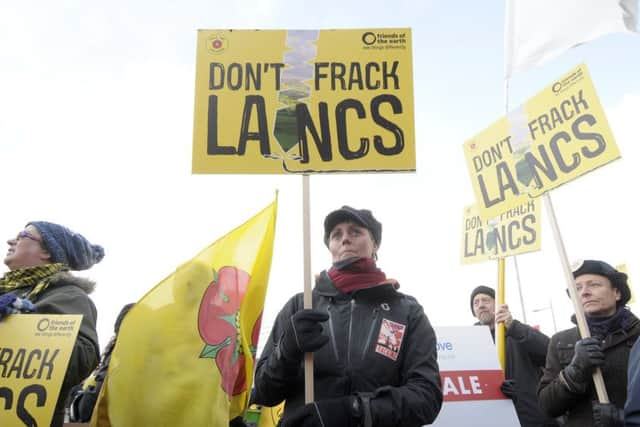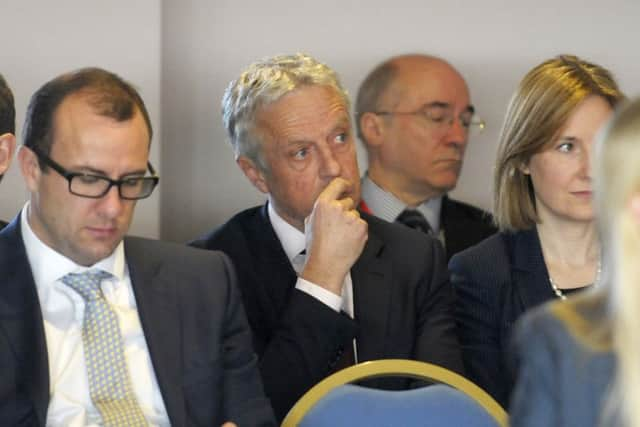'˜We have the same goal to stop fracking in Lancashire'


Protesters for and against shale gas extraction have been gathering outside a public inquiry to determine the future of fracking in Lancashire. Some have accused the groups of being a brigade of professional protesters who know little about Lancashire. But, as the inquiry took a day off, retired engineer TONY BALMER tells us in his own words what has compelled him to pick up the placards.
I recently read a particularly comment about the “outsiders” who are protesting about Cuadrilla’s planning application to extract shale oil and gas in Lancashire by fracking.
Advertisement
Hide AdAdvertisement
Hide AdAs one of those protesters and a proud Lancastrian, it stung me into writing a reply.


I was one of the 300 or so protesters braving the cold at Blackpool FC (where the public inquiry is being held).
Granted there were a few folks there from outside the county – mainly from other places under threat from fracking – but most of us were locals. Not nutters or tree-huggers – just ordinary people from all age groups and all walks of life.
There were a few things we had in common though:
- Most of us have never protested before in our lives.


- We’re all quite well-informed.
There’s a lot of good material around when you look for it – from government papers, from the fracking industry itself, from countries like the US and Australia where there’s actual experience, and from the 70 or so places that were concerned enough about the potential impact of the industry to impose a moratorium or an outright ban on it.
Advertisement
Hide AdAdvertisement
Hide AdIt’s all there – the noise, the air pollution, the chemicals they inject, the earth tremors, the groundwater contamination, the public health hazards, the stress on water supplies, the disposal and treatment of waste water, the increased road traffic, the threat to wildlife, the impact on the tourist economy, agribusiness and the food industry.
It’s just a shame more people don’t read it and decide for themselves.


Even if they decided all that lot is nothing to worry about they might be a bit concerned by the scale of development. The two sites under review at the moment are, after all, only exploratory. If this ever went ahead into production, the number of well sites in Lancashire alone would be counted in hundreds – and across the UK in thousands.
Now, that’s not a minor inconvenience to a handful of noisy local residents – that’s a significant re-allocation of the UK’s land resource. And I don’t think government should be doing that without careful consideration of all the other consequences. For example, the more land we allocate to fracking the less food we grow, the more we import, the greater our dependence on other countries, the greater cost of transportation, the more expensive food is in the shops.
OK, so maybe they dismiss all that as scaremongering too.
Advertisement
Hide AdAdvertisement
Hide AdBut then, a couple of months ago the UK was a signatory to the Paris agreement on climate change – our PM waxed most eloquently on the the need to reduce greenhouse gasses and committed us to a carbon neutral economy by 2050. When you boil it down, that means that about 80% of the fossil fuel reserves we already know about in the world today have to stay where they are – underground. So, even if there was zero risk associated with fracking – why on earth is the UK setting it’s stall out to find more?


Or maybe it’s about jobs – the climate’s all very well but we can worry about that later, can’t we? As we heard (at the inquiry) the fracking industry is going to employ 11 workers per site, so a few thousand sites equals a few tens of thousands of jobs right?
Except that, globally this is a declining market. In particular, it’s a market where the established players are dictating the barriers to entry for the new players. That’s maybe why the price of crude oil has dropped from $120 a barrel just over a year ago to around $30 a barrel now. You only have to look at the news to see how hard this is hitting the whole of the industry - Shell and BP have announced around 15,000 job losses in the last year.
By contrast the market that is about to take off world wide is in renewable energy (wind, wave, solar, tidal, geo-thermal). Not only is this environmentally clean, and secure (the wind will always blow and no-one’s yet managed to hold back the tides), but if coupled to a concerted attempt to insulate our homes properly, will reduce our dependency on fossil fuels, reduce domestic heating bills and create literally hundreds of thousands of skilled jobs in the UK in a growing market with significant export potential.
Advertisement
Hide AdAdvertisement
Hide AdBafflingly, the government has chosen to halt UK investment in these areas, while giving tax breaks to the oil and gas industry.
Strangely enough I didn’t really enjoy standing around for hours freezing half to death outside (Blackpool FC’s) Bloomfield Road.
So if anyone can tell me why I am wrong – provide me with some plausible evidence that fracking isn’t risky, or that ultimately there’s any real benefit to be had from what’s going on out at Roseacre Wood and Little Plumpton – both places I’ve known since I was a kid – then I’ll gladly give up and get on with something else.But if they can’t, perhaps they might like to pick up a placard and join me?
Cuadrilla’s view...
Francis Egan, chief executive officerfor Cuadrilla, said: “Lancashire has the opportunity to play a vital role in a national imperative through the exploration of shale gas.
Advertisement
Hide AdAdvertisement
Hide Ad“There is a key role for gas, along with renewables and nuclear power, to play in a 21stcentury low carbon energy future” recently stated the UK’s Chief Scientific Officer, John Loughhead.
“In the UK 84% of our homes are heated by gas, 61% homes use gas for cooking and around a third of electricity is generated from gas.
“At present in the UK we import approximately half of our gas needs from overseas and by 2030 this is forecast to increase to some 80%.
“We spend billions of pounds on these imports, money that could be spent creating jobs and tax revenue here in Lancashire and the rest of the UK. We have a stark choice to make as a country: explore for and utilise our own indigenous source of natural gas or choose to import an ever increasing amount at a higher cost to the environment, to jobs and to all UK tax payers.
Advertisement
Hide AdAdvertisement
Hide Ad“I also want to reassure the people of Lancashire that exploration can and will be done safely and in an environmentally responsible manner. The UK has one of the most robust regulatory regimes in the world and if our exploration sites are allowed to go ahead these will be the most closely monitored sites of any onshore oil or gas activity.
“What this means is that there will be no damage to public health, no contamination of public water supply or no damage from earth tremors, which I know some people have concerns about.
“In addition Lancashire will stand to reap the benefits of this new industry through additional tax revenue, inward investment, boost to local services such as hotels and most important jobs.
“Lancashire has the opportunity to lead the way, let’s take it.”